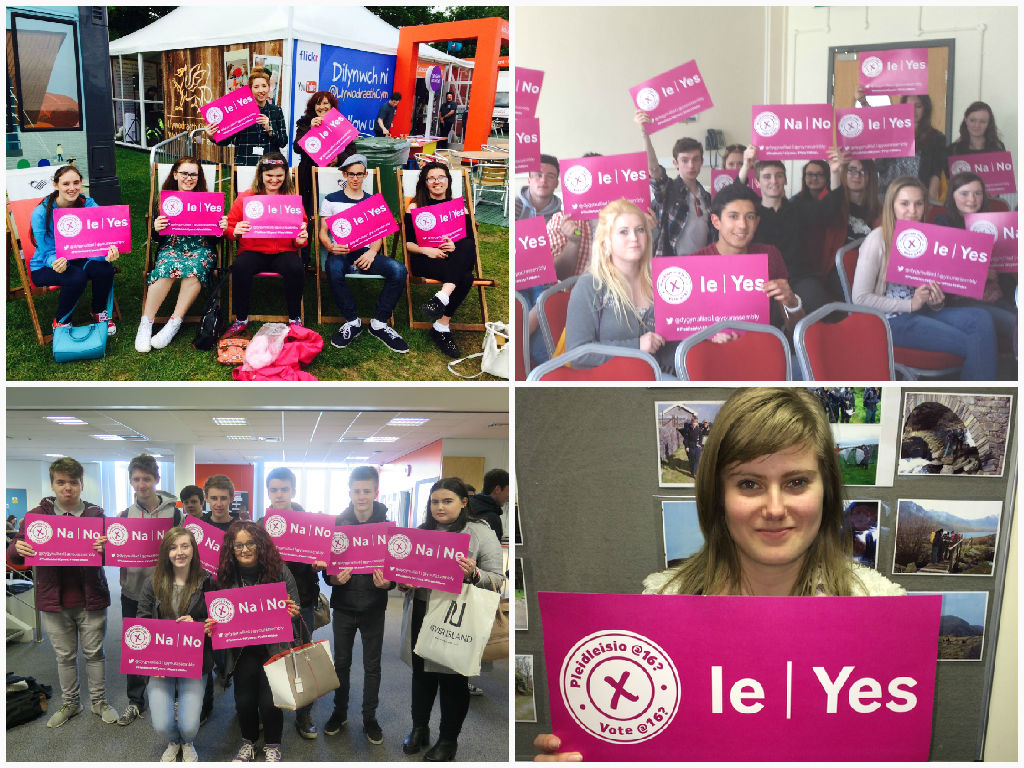Article by Aled McKenzie, National Assembly for Wales Research Service
Vote @16 Consultation
If the Assembly were a person, it would not yet be able to vote. As the Assembly turns 16 this year, the first generation to have not known life without it is fast approaching adulthood. The Assembly has recently finished gathering information from young people across Wales for its consultation, Vote @16, with the results set to be launched on 15 July at a youth conference in the Senedd.
There has been a growing debate across the UK about a possible extension of the franchise to 16 and 17 year olds. A report published during the last parliament by the House of Commons Political and Constitutional Reform Committee, explored the possibility of extending the vote and found many arguments in favour. The Report was inconclusive but recommended a free vote to be held in the House of Commons at some point in 2015.
Apathy and lack of engagement?
Among the young, levels of disengagement with politicians and apathy in general are a growing feature of politics. The Electoral Reform Society Cymru (ERS Cymru) found (pdf,857KB) that only 51 per cent of 16 and 17 year olds are registered to vote (16 and 17 year olds can be added to the electoral register prior to turning 18), whilst 65+ year olds are almost twice as likely to be registered with the number of 18–24 year old voters having dropped dramatically from 76 per cent in 1964 to 52 per cent in 2010. ERS Cymru believe that lowering the voting age, in conjunction with a National Youth Assembly for Wales (Word, 70.2KB) and citizenship lessons in schools could go some way to addressing this historic trend.
Votes at 16 elsewhere
16 and 17 year olds were able to vote for the first time anywhere in the UK last year during the referendum on Scottish independence, which resulted in over 100,000 of them registering to vote. It is not only in Scotland where registration for young voters increased upon the extension of the franchise. In the Isle of Man the rate of registration amongst 16 and 17 year olds was ‘very close to the turnout figure for the electorate as a whole’. Voters are also able to vote at 16 in Jersey and Guernsey.
A recent article in the Journal of Elections, Public Opinion and Parties claimed that giving 16 and 17 year olds the right to vote in Austria increased voter turnout as a whole, and this appears to have been reflected in Scotland during the General Election. Turnout in Scotland was 5 per cent higher than the UK average during the recent General Election. However, as with elsewhere in the UK the minimum voting age for the recent general election remained at 18 years old.
European Union Referendum
It is not expected that the referendum on continued membership of the EU will accommodate for the extension of the franchise to 16 and 17 year olds. The House of Commons briefing paper on the Bill states:
‘16 and 17 year olds cannot vote in UK Parliamentary elections and are therefore not included in the franchise for the referendum. The voting age was previously reduced in Scotland specifically for the Scottish independence referendum but Scotland has been given the power to legislate to allow 16 and 17 year olds to vote in Scottish Parliament elections. There is a Bill currently before the Scottish Parliament to make provision for reducing the voting age at these elections. Unless the voting age is reduced for UK Parliamentary elections, 16 and 17 year olds will not be able to vote in the referendum in any part of the UK.’
Whilst this is certainly not final, it does not appear as if 16 and 17 year olds will be given the opportunity to vote at the forthcoming referendum. Katie Ghose of the Electoral Reform Society claimed this is a ‘stark injustice’ to 16 and 17 year olds. During a debate on the Bill on the 9th June the SNP tabled a motion to try and prevent the bill from getting a second reading due to a multitude of perceived deficiencies, including the refusal of allowing 16 and 17 year olds to vote. Former SNP leader Alex Salmond tweeted the bill failed to make the ‘gold standard set in #indyref in terms of inclusivity and democratic participation.’ On the same day the Foreign Secretary responded to a question on the subject:
‘Our position is that the appropriate franchise for a United Kingdom question—a question about the future of the whole country—is the Westminster franchise. I know there are people in this House who think we should review the scope of the Westminster franchise, and that is another debate. We are very clear that the franchise for this referendum should be the Westminster franchise, and that it would not be appropriate, as an exception, to include 16 and 17-year-olds.’
When could this change happen?
Of the parties currently represented in the Welsh Assembly, Labour, Plaid Cymru and the Liberal Democrats are in favour of lowering the voting age in Assembly elections. The First Minister Carwyn Jones has also voiced his support for lowering the voting age following the referendum on Scottish Independence.
In 2012, the Welsh Assembly debated lowering the voting age to allow 16 and 17 year olds to vote, however as Whitehall retains control over elections in Wales the debate was symbolic. Nevertheless, control over the Assembly’s own elections is expected to be devolved in a forthcoming Wales Bill, announced in the Queen’s Speech. However, this is unlikely to happen in time for next year’s Assembly elections. The earliest it is likely to be introduced therefore will be during the term of the Fifth Assembly. By the time of the 2021 Assembly elections, the youngest voters will be for the first time younger than the institution which they will be voting for.







